 |
|
MAGNIFICO & TURBOLENTZA (Slovenia)
Slovenia’s Robert Peöut is a multifaceted phenomenon and one of the biggest and most controversial celebrities of his native country. The musician and actor appears in the most diverse masquerades, e.g. disguised as a deity of fertility. In addition to his various activities he creates movie soundtracks and appears in feature films. As “Magnifico” he appears as a sleazy yugoslavian pimp. “Hir ai kam, hir ai go” cracked the italian charts as a distinctive summer hit. Surf sound meets dance music, driven by a high speed balkan brass band.
|
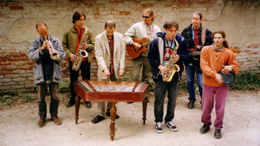 |
|
BESH O DROM (Hungary)
The collective from Budapest grouped around a core consisting of jazz saxophonist Gergo Barcza and percussionist Ádám Pettík. The name of the band means “Go your own way” in the language of the Roma. Besh o droM play in a rock line-up, broadened by a brass section and classic Hungarian folk instruments. Besh o DroM find their raw material in the whole Balkans and beyond – from Hungary to Turkey, from Macedonia to Russia. With a DJ and clashing funk and jazz rock grooves, Besh o droM is anchored in club culture. |
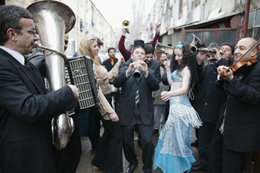 |
|
MAHALA RAÏ BANDA (Romania)
Mahala are the down-and-out suburbian slums of Romania and Moldavia. Here, Mahala RaÔ Banda founder and leader, Aurel Ionita, has kept a close ear on the original music of the streets and parties. He strived for a music radically denouncing the phoney folklore of Bucarest cafes, nevertheless aiming to breach the “authentic” tradition. Mahala RaÔ Banda draws from the source of the balkan’s ethnic mosaic. Rural Moldavian folk collides with urban gypsy groove, oriental embellishments, and funk. Rarely heard in balkan folk bands, the drums/percussion combination adds a powerful colour to Mahala RaÔ Banda’s sound. With his first band, Rom Bengale, Ionita strived for his vision of “musica pop” to perfect it with Mahala RaÔ Banda.
|
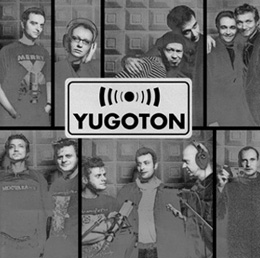 |
|
YUGOTON & KAZIK (Poland/Croatia/Serbia)
Punk enfant terrible, Kazimierz “Kazik” Staszewski, fronted the legendary Polish band Kult. For his other projects, he has dabbled in rap, metal, and rock, as well having recorded tributes to Kurt Weill, Tom Waits, and Nick Cave. With Yugoton, Kazik unites Polish and Yugoslavian indie legends like Kasia Nosowska, Darko Rundek and Vlado Divlijan. On “Yugoton”, they reinterpret hits of the legendary Yugoslavian New Wave. |
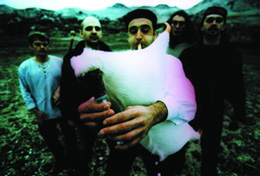 |
|
LEGEN (Croatia)
In 1992, Legen was founded by Mojmir Novakovic. Novakovic is inspired by archaic Croatian music and hybridizes his original compositions with up-to-date dance beats and ambient soundscapes. His mission is to resurface treasures and wisdom of the past for the present. With a soft spot for symbolic connotations, Legen played their first show during the Spring Equinox 1993. The band organizes festivals for international traditional music and celebrates the wealth of cultures in the world. But Legen doesn’t play music for the head. This encounter of prehistoric wildness, Croatian tradition, and massive shamanic drums connects directly with the soul. Since 2002 the band has been on hiatus, and Novakovic founded his new project, Kries. |
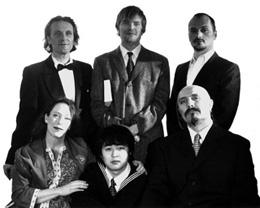 |
|
KULTUR SHOCK (USA/Bosnia/Japan/Bulgaria)
Eine Seattle-Band bei Balkan Beats? Kultur Shock stehen dem Grunge- und Alternative-Einerlei so fern wie es nur geht. Sie fanden lediglich in Seattle/USA zusammen: Ein Sänger und zwei Gitarristen aus Bosnien und Bulgarien, ein japanischer Bassist, ein Geiger und ein Drummer aus den USA. Kultur Shock kokettieren mit ihrem Immigranten-Status und bezeichnen sich ironisch „foreigners who came to take your job away“. Der Stil der multiethnischen Band lässt sich schwer in Worte fassen. Sänger Gino Srdjan Yevdjevich singt auf englisch, serbisch, bosnisch, kroatisch, rumänisch und bulgarisch. Die Songs schlagen hundert Haken – von Gypsy Music zu dreckigen Garage Punk, Metal-Anleihen und ölige Disco-Beats vereinen sich unzählige Stilelemente zu einer anarchischen Party-Musik, die mit Brachialgewalt Genres und Ländergrenzen niederwalzt. Ihr bislang letztes Album, „Kultura Diktatura“, wurde vom ehemaligen Faith No More-Bassisten Billy Gould produziert und auf seinem Label veröffentlicht. |
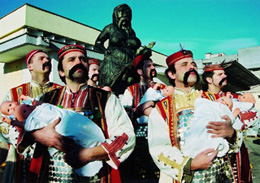 |
|
LET 3 (Croatia)
They pose in traditional folk costumes and fake moustaches or just dress with a muzzle on a certain special place. At one point they announced their intention to commit collective suicide and a mercenary shot them in public. After their resurrection they dedicated their unspeakably loathsome sculpture “Babin kurac” (“Grandma’s dick”) to the nations of the Balkans, the USA and Russia. Somewhere between barbarism, satire, and concept art – Let 3 are Croatia’s number one musical provocateurs, excellent musicians, and underground theatre act at the same time. Let 3 toy around with national myths, process them through the grinder, and serve them in shape of sonic punk grenades. Their hit “Tazi-Tazi” spoofs the popular fake brass sound of the Balkan hit charts, being incredibly catchy and intoxicating. |
 |
|
KAYAH & BREGOVIC (Poland/Bosnia)
Kayah comes from Bialystok/Poland. After having already released two successful pop albums, she had a huge commercial and artistic success together with the Bosnian composer Goran Bregovic. Bregovic started as a bass player before he rose to superstardom with his band Bijelo Dugme in 1974. His international reputation is based on his film music, especially for the films of Emir Kusturica. The growing popularity of Balkan music is mainly thanks to Bregovic. For their project, Kayah and Bregovic merged Polish, Jewish, and Oriental influences in a multilayered kind of music, mostly based on her dark, glowing, passionate voice. Thus “Kayah & Bregovic” became one of the most successful Polish records of the past years. |
 |
|
FRANK LONDON’S KLEZMER BRASS ALL STARS (USA)
Frank London is the trumpet player of New York’s klezmer stars The Klezmatics. The restless workaholic pursues countless cooperations, including his Klezmer Brass All Stars and the Hasidic New Wave project. London has worked with avantgarde protagonists such as John Zorn and LaMonte Young and appeared on more than a hundred recordings – among them They Might Be Giants, David Byrne, Gal Costa, and Ben Folds Five. He has built a reputation as a record producer, film composer, and a conservatory teacher of Jewish music, teaching in Canada and the US. With the Klezmer Brass All Stars, London fuses Eastern European Jewish traditions with Serbian brass music and a lot of good New York jazz magic. |
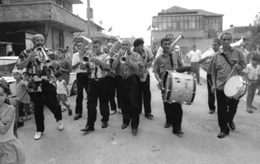 |
|
KARANDILA (Bulgaria)
The Bulgarian brass band Karandila doesn’t confine itself to a perfect performance of traditional wedding music. An explosive, celebratory mixture evolves when they cast an eye on New Orleans and Memphis and pick up fiery funk and bebop. Here, they interpret an elegic ballad. Composer and civil rights activist Zarko Jovanovic wrote “Djelem, djelem” in 1969 after the violent evacuation of a Roma camp, resulting in the death of an infant. Two years later, the song was declared the official anthem of all Roma people. The lyrics go “I too once had a large family, but the black legion murdered them. Come with me, Roma of the world, to where the Romani roads have been opened. Now is the time – stand up, Roma”. Lead vocals in this version are taken by Maya, a young Roma girl from the Gypsies’ ghetto in the town Sliven, recorded professionally for the first time in her life. |
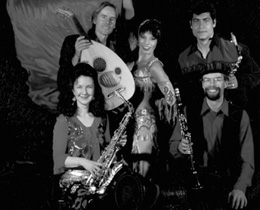 |
|
SSASSA (Macedonia/Switzerland)
Ssassa, a Macedonian-Swiss band, plays classical Macedonian and Oriental music in a transparent sound dominated by Marem Aliev’s incredible skills on various woodwind instruments. Ssassa delves deeply into Balkanic, Maghrebinian, and middle eastern traditions, linking them to something new. “Romanela” is a traditional Roma dance, recorded with a moorish flamenco accompaniment. |
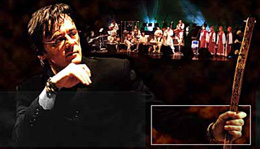 |
|
SANJA ILIC & BALKANIKA (Serbia)
Pianist Aleksandar Sanja Ilic started his career with the rock band “San” and soon became a sought after composer. Like many yugoslavian musicians, he broadened his musical horizon with the creation of theatre and film music. Vice versa, he includes theatralic elements in his shows, working extensively with singing actors. His recent project, Balkanika, combines various folk traditions of the Ottoman empire and contemporary arrangements. |
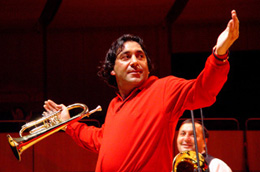 |
|
BOBAN MARKOVIC ORKESTAR (Serbia)
Last but not least, it was partly due to the exuberant brass music soundtrack that Emir Kusturica’s 1995 film “Underground” achieved cult status. Most of the time, the viewer would listen to Boban Markovic and his orchestra. Markovic is deemed king of Serbian trumpeters and his orchestra was in a league of its own at the renowned Guca brass festival, winning five times. Furthermore, Markovic is a brilliant, incredibly inventive arranger, embellishing his breathtaking brass sound with a plethora of original ideas. His skills and cultural openness earns him a good reputation among jazz fans. And then there is his infinite energy – at the Budapest Pepsi Sziget festival, the blasting sound outshined even headliner Oasis. |
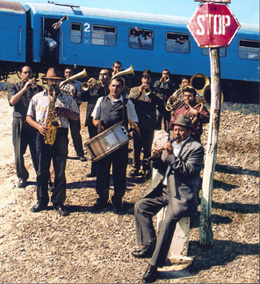 |
|
FANFARE CIOCARLIA (Rumania)
Romania’s most famous Roma brass band hails from Zece Prajini, a village close to the Romanian-Moldavian frontier. The twelve musicians between 20 and 66 years old pass for Romania’s best and fastest gypsy band. A thundering tuba beats as if emerging from battered stovepipes, trumpets, and clarinets somersault frantically, kettledrums rumble resulting in the distinct Fanfare sound approaching 200 bpm. Firmly rooted in the rural wedding band tradition of Romania, Fanfare Ciocarlia built a worldwide following. From Romanian peasant weddings to Hollywood composer Danny Elfman’s anniversary, they have played on five continents. |
 |
|
GEORGE DALARAS & GORAN BREGOVIC (Greece/Bosnia)
George Dalaras is one of the most renowned and prolific Greek singers. In 1997 he and his musicians worked with Goran Bregovic’s orchestra. The ten songs of their album “Thessaloniki-Yannena with two canvas shoes” have been recorded simultaneously in Athens and Belgrade. During their musical encounter, Dalaras and Bregovic created mediterranean music from Yugoslavian, Greek and Bulgarian elements. A melancholic bouzouki sound is seamlessly integrated into the tight rhythms of Bregovic’s orchestra, topped with Dalaras’ highly expressive bittersweet vocals. This song here is based on Bregovic’s ‘Messechina’, written for the film ‘Underground’. |
|